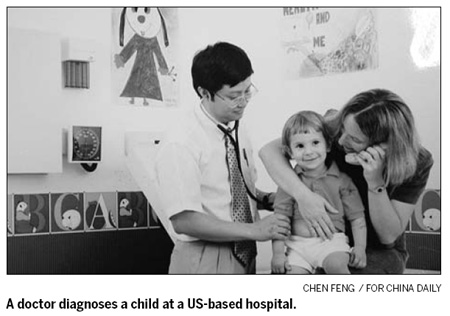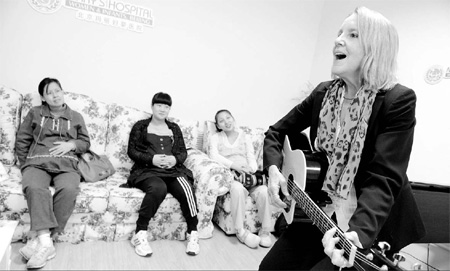Focus
Why the well-heeled shy away from public hospitals
By Ou Lu (China Daily)
Updated: 2010-05-27 07:51
 |
Large Medium Small |
|
|
"Luckily, I don't have to visit hospitals so often because I am very healthy. And even with a cold, I prefer to self medicate," said the 29-year-old IT professional. (Zhai is not her real name because her company's policy will not allow her to reveal it.)
Zhai's fear was exacerbated by her company's policy of fully paid annual physical check-ups.
"I skipped physical examinations the past two years because I no longer wanted to go through the humiliating experience," she told METRO.
Zhai's company pays about 200 yuan for each of its 500 employees for a check-up at a 3A hospital, the highest-rated public hospital in China, close to where she works.
"The check-up is available on only two dates, and if you can't show up on one of those days, you'll miss it," Zhai said.
"That means I have to do it with about 250 of my colleagues, male and female, my bosses and my subordinates. This is unbearably embarrassing."
Her last experience two years ago was the last straw, she said, when she had to undergo a breast examination in front of a dozen female colleagues.
"The doctor asked me to undress in the presence of colleagues," she said. "After she completed the examination, she shouted out that I had some symptoms of atypical breast hyperplasia (Atypical hyperplasia may sometimes be a forerunner to the development of breast cancer.)
"Not even bothering to tell me what I should do to reduce the risk of getting breast cancer, she immediately turned to the next person to be examined."
She said the doctor's lack of respect of her personal information and her indifference made her angry and humiliated in front of her colleagues.
From then, Zhai no longer wanted the free examination. This year, she felt a thorough check-up was needed, and she picked the Taiwanese-run MJ Health Screening Center in Beijing, highly recommended by a friend, with state-of-the-art facilities.
The examination cost Zhai more than 3,000 yuan, a third of her monthly income. But she said it was worth the price.
"The softly spoken nurses and doctors timed the 30-odd tests so well that I finished all of them in four hours," she said. At overcrowded public hospitals, she's had to wait for half an hour to have a chest X-ray and an hour for ultrasonic testing.
Zhai found the personalized services most attractive.
"I received a lot of attention from the doctors there and at the end of the exam, they got to know me very well," she said.
"The doctors explained to me everything I want to know about my physical conditions, no matter how minor it might be, and they told me how to improve my health.

"In public hospitals, the doctors would give me five minutes at the most for the consultation, and it's always me talking. They seem easily irritated by my questions."
Zhai, together with a large group of Beijing's emerging upper-middle class, would sometimes be willing to pay dearly for a premium healthcare service.
That is partly the reason why there is a growing number of foreign healthcare providers - such as United Family Hospital, backed by the US-based Chindex International, and the Singapore-based hospital chain Parkway Healthcare Group - in China's major cities.
China has more than 30 joint venture clinics and medical centers, mostly in Beijing, Shanghai and Guangzhou.
Jeffrey Staples, president of Parkways' China and North Asia operations, likens his hospitals to five-star hotels and said he wanted to pamper more Chinese clients with the five-star experience.
Parkway runs seven joint-venture clinics in China, with six in Shanghai and one in Chengdu. The chain intends to tap into the Beijing market soon.
Staples said his chain and many other top-end international medical service providers mainly target three groups of clients - expatriates, Chinese people working for multinational corporations who are provided with expensive private medical insurances, and well-off locals.
Another reason for the growth is the government's willingness to open the healthcare sector to foreign and private capital.
Staples said domestic hospitals need to team with foreign peers who can introduce them to the international healthcare standards, while foreign hospitals need local partners to better understand the needs of local patients.
Ministry of Health regulations say joint ventures can be established only if the foreign majority share does not exceed 70 percent.
While most Chinese people still largely rely on government-backed medical insurance to reimburse medical bills, and private healthcare insurance is still a rarity, private hospitals and health screening centers are still only for the well-heeled.
At Parkway Health, the average cost for each visit is about 1,200 yuan, far higher than the 100-200 yuan at State-run hospitals.
And as for United Family, the best-known foreign hospital in Beijing, the basic consultation fee is 1,000 yuan.
It charges about 50,000 yuan to deliver a baby, almost 10 times what a public hospital would charge. In return, clients receive tailored services from a personal obstetrician throughout the pregnancy.
At public hospitals, people usually have to wait for hours to get a doctor's appointment, and may would see a different doctor each time.
"I've heard that at public hospitals, there are just so many women waiting to deliver babies the doctors could only give each woman in labor one hour," said Wang Xi, 33, a mother-to-be who has chosen to deliver at United Family Hospital.
"That is why doctors at public hospitals often suggest caesarean sections."
China Daily

